Related Research Articles
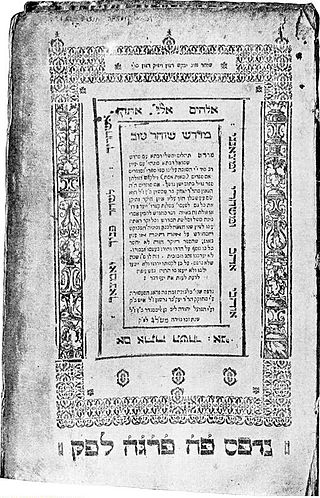
Midrash is expansive Jewish Biblical exegesis using a rabbinic mode of interpretation prominent in the Talmud. The word itself means "textual interpretation", "study", or "exegesis", derived from the root verb darash (דָּרַשׁ), which means "resort to, seek, seek with care, enquire, require", forms of which appear frequently in the Hebrew Bible.

The Torah is the compilation of the first five books of the Hebrew Bible, namely the books of Genesis, Exodus, Leviticus, Numbers and Deuteronomy. The Torah is known as the Pentateuch or the Five Books of Moses by Christians. It is also known as the Written Torah in Jewish tradition. If meant for liturgic purposes, it takes the form of a Torah scroll. If in bound book form, it is called Chumash, and is usually printed with the rabbinic commentaries.

According to the Bible, Jochebed was a daughter of Levi and mother of Miriam, Aaron and Moses. She was the wife of Amram, as well as his aunt. No details are given concerning her life. According to Jewish legend, she is buried in the Tomb of the Matriarchs, in Tiberias. In the New Testament, she is praised for her faith in God.
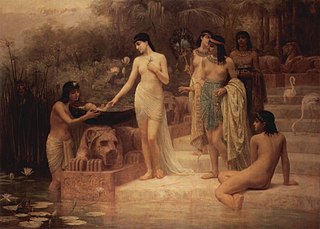
Shemot, Shemoth, or Shemos is the thirteenth weekly Torah portion in the annual Jewish cycle of Torah reading and the first in the Book of Exodus. It constitutes Exodus 1:1–6:1. The parashah tells of the Israelites' affliction in Egypt, the hiding and rescuing of the infant Moses, Moses in Midian, the calling of Moses, circumcision on the way, meeting the elders, and Moses before Pharaoh.
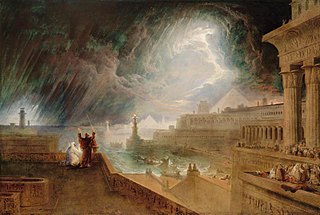
Va'eira, Va'era, or Vaera is the fourteenth weekly Torah portion in the annual Jewish cycle of Torah reading and the second in the Book of Exodus. It constitutes Exodus 6:2–9:35. The parashah tells of the first seven Plagues of Egypt.

Yitro, Yithro, Yisroi, Yisrau, or Yisro is the seventeenth weekly Torah portion in the annual Jewish cycle of Torah reading and the fifth in the Book of Exodus. The parashah tells of Jethro's organizational counsel to Moses and God's revelation of the Ten Commandments to the Israelites at Mount Sinai.

Terumah, Terumoh, Terimuh, or Trumah is the nineteenth weekly Torah portion in the annual Jewish cycle of Torah reading and the seventh in the Book of Exodus. The parashah tells of God's instructions to make the Tabernacle and its furnishings. The parashah constitutes Exodus 25:1–27:19. It is made up of 4,692 Hebrew letters, 1,145 Hebrew words, 96 verses, and 155 lines in a Torah Scroll. Jews in the Diaspora read it the nineteenth Sabbath after Simchat Torah, generally in February and rarely in early March.
Tetzaveh, Tetsaveh, T'tzaveh, or T'tzavveh is the 20th weekly Torah portion in the annual Jewish cycle of Torah reading and the eighth in the Book of Exodus. The parashah reports God's commands to bring olive oil for the lamp, make sacred garments for the priests, conduct an ordination ceremony, and make an incense altar.

Ki Tisa, Ki Tissa, Ki Thissa, or Ki Sisa is the 21st weekly Torah portion (parashah) in the annual Jewish cycle of Torah reading and the ninth in the Book of Exodus. The parashah tells of building the Tabernacle, the incident of the Golden calf, the request of Moses for God to reveal God's Attributes, and how Moses became radiant.

Vayakhel, Wayyaqhel, VaYakhel, Va-Yakhel, Vayak'hel, Vayak'heil, or Vayaqhel is the 22nd weekly Torah portion in the annual Jewish cycle of Torah reading and the 10th in the Book of Exodus. The parashah tells of the making of the Tabernacle and its sacred vessels. It constitutes Exodus 35:1–38:20. The parashah is made up of 6,181 Hebrew letters, 1,558 Hebrew words, 122 verses, and 211 lines in a Torah scroll.

Pekudei, Pekude, Pekudey, P'kude, or P'qude is the 23rd weekly Torah portion in the annual Jewish cycle of Torah reading. It is the 11th and last in the Book of Exodus. The parashah tells of the setting up of the Tabernacle.
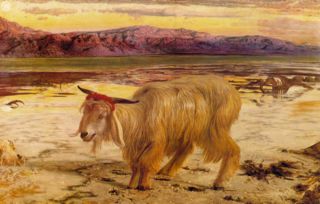
Acharei Mot is the 29th weekly Torah portion in the annual Jewish cycle of Torah reading. It is the sixth weekly portion in the Book of Leviticus, containing Leviticus 16:1–18:30. It is named after the fifth and sixth Hebrew words of the parashah, its first distinctive words.

The Pharaoh's daughter in the story of the finding of Moses in the biblical Book of Exodus is an important, albeit minor, figure in Abrahamic religions. Though some variations of her story exist, the general consensus among Jews, Christians, and Muslims is that she is the adoptive mother of the prophet Moses. Muslims identify her with Asiya, the Great Royal Wife of the pharaoh. In either version, she saved Moses from certain death from both the Nile river and from the Pharaoh. As she ensured the well-being of Moses throughout his early life, she played an essential role in lifting the Hebrew slaves out of bondage in Egypt, their journey to the Promised Land, and the establishment of the Ten Commandments.

Shlach, Shelach, Sh'lah, Shlach Lecha, or Sh'lah L'kha is the 37th weekly Torah portion in the annual Jewish cycle of Torah reading and the fourth in the Book of Numbers. Its name comes from the first distinctive words in the parashah, in Numbers 13:2. Shelach is the sixth and lecha is the seventh word in the parashah. The parashah tells the story of the twelve spies sent to assess the promised land, commandments about offerings, the story of the Sabbath violator, and the commandment of the fringes.

Behar, BeHar, Be-har, or B'har is the 32nd weekly Torah portion in the annual Jewish cycle of Torah reading and the ninth in the Book of Leviticus. The parashah tells the laws of the Sabbatical year and limits on debt servitude. The parashah constitutes Leviticus 25:1–26:2. It is the shortest of the weekly Torah portions in the Book of Leviticus. It is made up of 2,817 Hebrew letters, 737 Hebrew words, 57 verses, and 99 lines in a Torah Scroll.

Bemidbar, BeMidbar, B'midbar, Bamidbar, or Bamidbor, is the 34th weekly Torah portion in the annual Jewish cycle of Torah reading and the first in the Book of Numbers. The parashah tells of the census and the priests' duties. It constitutes Numbers 1:1–4:20. The parashah is made up of 7,393 Hebrew letters, 1,823 Hebrew words, 159 verses, and 263 lines in a Torah Scroll. Jews generally read it in May or early June.

Behaalotecha, Behaalotcha, Beha'alotecha, Beha'alotcha, Beha'alothekha, or Behaaloscha is the 36th weekly Torah portion in the annual Jewish cycle of Torah reading and the third in the Book of Numbers. The parashah tells of the Menorah in the Tabernacle, the consecration of the Levites, the Second Passover, how pillars of cloud and fire led the Israelites, the silver trumpets, how the Israelites set out on their journeys, the complaints of the Israelites, and how Miriam and Aaron questioned Moses. The parashah comprises Numbers 8:1–12:16. It is made up of 7,055 Hebrew letters, 1,840 Hebrew words, 136 verses, and 240 lines in a Torah Scroll.
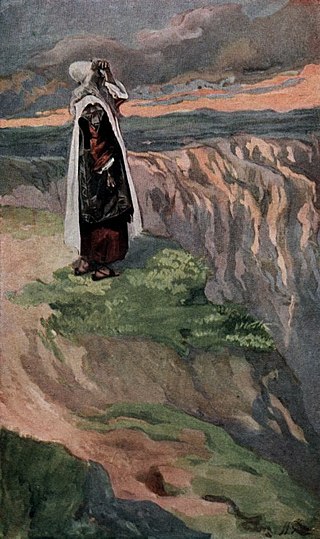
Pinechas, Pinchas, Pinhas, or Pin'has is the 41st weekly Torah portion in the annual Jewish cycle of Torah reading and the eighth in the Book of Numbers. It tells of Phinehas's killing of a couple, ending a plague, and of the daughters of Zelophehad's successful plea for land rights. It constitutes Numbers 25:10–30:1. The parashah is made up of 7,853 Hebrew letters, 1,887 Hebrew words, 168 verses, and 280 lines in a Torah scroll.
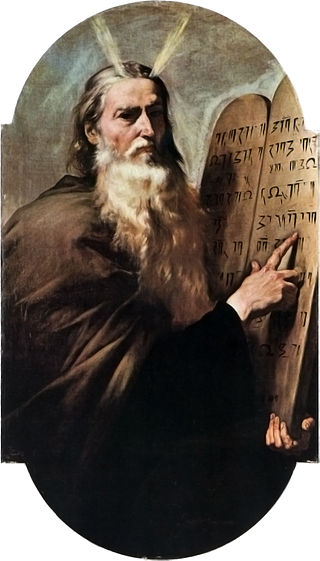
Mosaic authorship is the Judeo-Christian tradition that the Torah, the first five books of the Hebrew Bible/Old Testament, were dictated by God to Moses. The tradition probably began with the legalistic code of the Book of Deuteronomy and was then gradually extended until Moses, as the central character, came to be regarded not just as the mediator of law but as author of both laws and narrative.
Jewish traditions across different eras and regions devote considerable attention to sexuality. Sexuality is the subject of many narratives and laws in the Tanakh and rabbinic literature.
References
- 1 2 "torahinmotion.org Biography". Archived from the original on 14 September 2007. Retrieved 16 December 2006.
- ↑ "Interview with Avivah Gottlieb Zornberg". Archived from the original on 8 August 2016. Retrieved 10 February 2013.
- 1 2 Random House Canada, Author Spotlight: Avivah Gottlieb Zornberg Archived September 30, 2007, at the Wayback Machine
- ↑ PBS Genesis: Participants
- ↑ Avivah Gottlieb Zornberg. The Beginning of Desire: Reflections on Genesis. New York: Image Books/Doubelday, 1995. ISBN 0-385-48337-6.
- ↑ "Past Winners". Jewish Book Council. Archived from the original on 5 June 2020. Retrieved 24 January 2020.
- ↑ Adelman, Rachel. "Avivah Gottlieb Zornberg". Jewish Women's Archive.